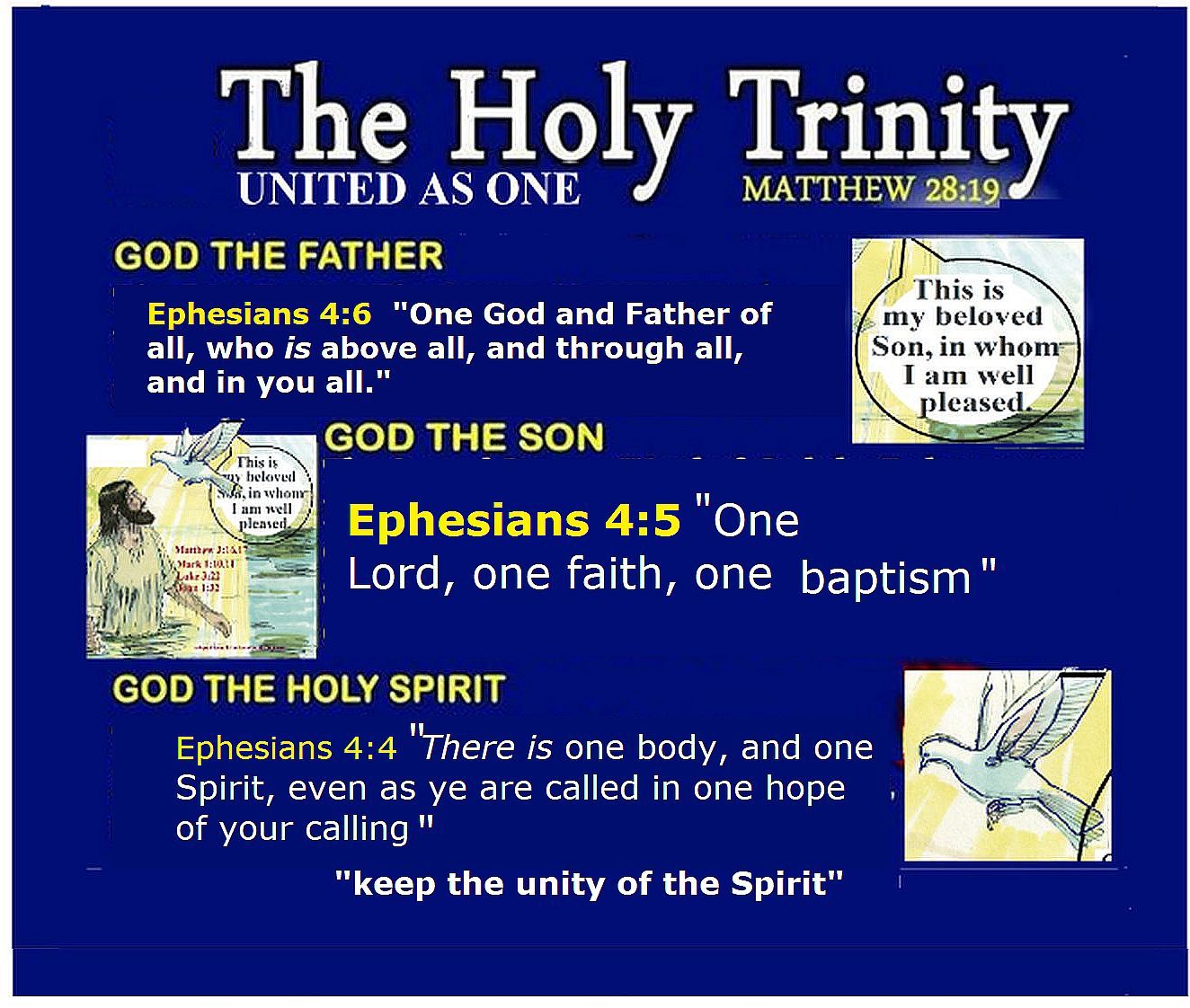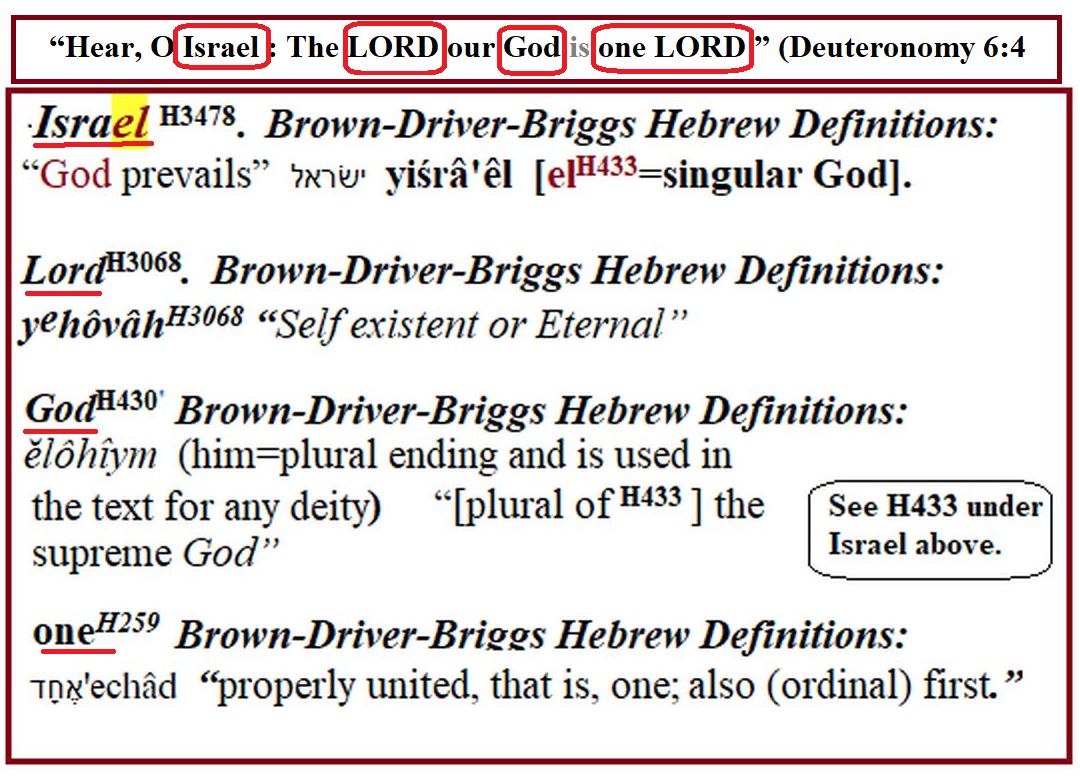QUEST FOR A DEFINITION OF THE TRINITY

|
At first glance, I suppose one would be inclined to say, This is either a boring subject or too complicated to interest me. However, when one considers the prayer of Jesus and the Spirit's command to obey Jesus desire in the matter, the subject becomes very important. Jesus acknowledged the oneness of the Godhead but He also prayed that His followers would imitate that oneness. How can we obey that prayer and command if we don't understand it?
The problem that Christians have is how can we be “monotheistic” and yet define the Father, the Son, and the Holy Spirit. Historically, an attempt to do this has caused harsh divisions and produced labeled heretics. One main problem is that the Bible mentions neither monotheism nor trinity while referring to God as one.
A typical verse for the ONE GOD in creeds and teachings is “Hear, O Israel imes New Roman, serif">: The LORD our God is one LORD ” (Deuteronomy 6:4).
The numbers represent Strong’s Dictionary assigned numbers for the Hebrew words.“Hear, O IsraelH3478: The LORDH3068 our GodH430 is oneH259 LORDH3068”
THE DIVINITY OF JESUS.
One teacher that had originally publicly proclaimed, “Do not confuse Jesus with God,” eventually admitted and confessed that “Jesus was worshipped alongside God in the earliest known Christianity” (Hurtado confesses, 2003, 2005).i Historically Jesus has been accepted as divine; i.e., He is God. But what about there being only "one" god? And how has "the church" dealt with this anomaly? How should I personally resolve this? In this chapter we will look at the history of man's uninspired resolutions.
THE FIRST KNOWN HUMAN CREED separate from the Spirit-inspired New Testament: The Apostles’ Creed. While the Apostles’ Creed was not written by the twelve disciples of Acts 2 and consequently would not be inspired, it is ancient, dating back to the first of the second century soon after the apostle John’s death. It begins, “I believe in God the Father,” and continues with “and in the Lord Jesus Christ,” and culminates with “I believe in the Holy Spirit.” ii Apparently from this confession, it was important for the early believers to believe in the three as being divine .
By the late second and third century authors had used terms not just to refer to the one God, but rather to refer to the plurality of the one God, together with his Son (or Word) and his Spirit. They therefore professed a “trinity”, triad or threesome. iii
TERTULLIAN (155/160 —died after 220) considered this scheme of two creators and a divine Jesus to be inconsistent with monotheism (Tertullian Praxeas, ch. 3). Against the common believers concerned with monotheism, Tertullian argues that although the above process results in two more who can be called “God”, it does not introduce two more gods - not gods in the sense that Yahweh is a god. Nor are the persons equally divine; e.g., Tertullian holds that the Son is “ignorant of the last day and hour, which is known to the Father only” (Tertullian, Praxeas, ch. 27; Matthew 24:36). However, Tertullian is now hailed by trinitarians for his use of the term “Trinity.” ORIGEN AND a subordinationist doctrine (third century). ( c. 185 – c. 253) The God and Father, who holds the universe together, is superior to every being that exists, for he imparts to each one from his own existence that which each one is; the Son, being less than the Father, is superior to rational creatures alone (for he is second to the Father); the Holy Spirit is still less, and dwells within the saints alone. So that in this way the power of the Father is greater than that of the Son and of the Holy Spirit, and that of the Son is more than that of the Holy Spirit… (Origen, First, 33–4 [I.3]) Origen (ca. 186–255),
ARIUS (c. 250—died 336). Arius taught, in accordance with an earlier subordinationist theological tradition, that the Son of God was a creature, made by God from nothing a finite time ago. He taught some time around 318 AD. The Council of Nicaea, subsequently in May 325, declared Arius a heretic because he refused to sign a formula of faith stating that Christ was of the same divine nature as God. iv
THE NICENE CREED. Following Emperor Constantine legitimatizing Christianity, the Council of Nicaea (AD 325) included some three hundred “bishops,” many of whom bore the scars of persecution, and was convened primarily to resolve the debate over Arianism, the false teaching that Christ was just a creature, an angel who was the highest created being, but not God. AUGUSTINE (396 to 430 AD). His mammoth On the Trinity (Latin: De Trinitate) has been endlessly mined by later theologians. In it, Augustine is concerned to defend Pro-Nicene trinitarianism against lingering “Arianism” and other heresies, confessing that this “is also my faith inasmuch as it is the Catholic faith” (70 [I.2.7]) Augustine suggests that the standard creedal term “person” (Greek: hypostasis or prosopon; Latin: persona) is adopted simply so that something may be said in answer to the question “What is God three of?” (224–30 [VII.3], 241 [VIII.1.1], 398 [XV.1.5]) The term “person”, he thinks, signifies a genus, but it is one for which we can provide no species. In contrast, the words “divine essence” names neither a genus nor a species. THE ATHANASIAN CREED (fourth or fifth century). Both of the Nicene and Athanasian creeds insist on the unity of essence between the persons of the Trinity. However, the Nicene creed begins with the person of the Father and explains the Son’s divinity in relation to him.
This creed teaches that whoever
wants to be saved should above all cling to the catholic faith.
Whoever does not guard it whole and inviolable will perish
eternally. Now this is the catholic faith: “We worship one God in
trinity and the Trinity in unity, neither confusing the persons nor
dividing the divine being. For the Father is one person, the Son is
another, and the Spirit is still another. But the deity of the
Father, Son, and Holy Spirit is one, equal in glory, coeternal in
majesty.”
The obvious conclusion from history therefore is that teachers must conform to the historically acceptable "Catholic" creed of men. One may not vary from this "Catholic" approved trinity wording. It is apparently heretical for one to teach and believe in the plurality of the God of the Bible. This is true even if you are a Protestant. Yet this is what is taught in the Old Testament of the Bible: i.e., God is a plural. For example, even the first chapter of Genesis mentions God as saying, "Let us make ..." "Us" and "our" are plural pronouns and it is the words of the Creator in reference to Himself. If you know the Hebrew language then you know that God references Himself as Elohim which is plural for "Gods" and it would be obvious to you. But if you only speak or read in English, this is a hidden fact to you. At the same time the plural appellation would not necessarily mean that you believed in multiple gods. You might only think that “Gods” was the name or stood for the true and living Creator just like the ancient Hebrews must have. Mohammed imitated using the plural for his Allah in the Koran when he would have Allah addressing Himself. v
The Torah Jewish teachers use the same explanation as the Muslims do. Their concept of the greatness of the true God, so their rabbis argue, requires the use of the plural. However, it is appropriate to ask (1) why is the plural not required for the English reader of, e.g., the King James Translation; and (2) why did the ancient Hebrews use the same plural word when referencing their neighbors' false gods and idols. So it could not mean that the plural required "extra" majesty. However, it has beeen pointed out that the verb "created" in verse 1 is singular and subject-verb agreement requires the subject to also be singular. Rather than accuse the prophets as being ignorant of this grammar rule, we will actually find that this is not an exclusive rule but that there is a another rule that is applicable here. Confusing? Stay with us. Let’s get into the mystery of the "Creator/s" in Genesis with Part 1 (link at the top and below). Hopefully, we might clarify the issue and promote the truth according to the inspired texts instead of man's speculations (Catholic or Protestant). GAYLON WEST---- edited by Janie Ward and Mary L. West ii https://realfaith.com/what-christians-believe/history-doctrine-trinity/ iii https://plato.stanford.edu/entries/trinity/trinity-history.html iv https://www.britannica.com/biography/Arius v https://islamqa.org/hanafi/darululoomtt/148800/the-word-we-us-used-by-allah-in-the-holy-quran/#:~:text=Answer%3A%20Assalamu%20Alaikum%2C%20%E2%80%98We%E2%80%99%20in%20the%20Quran%20refers,plural%20form%20and%20these%20refer%20to%20Allah%20Alone. vi https://ancient-hebrew.org/name-god/hebrew-word-for-god.htm |

